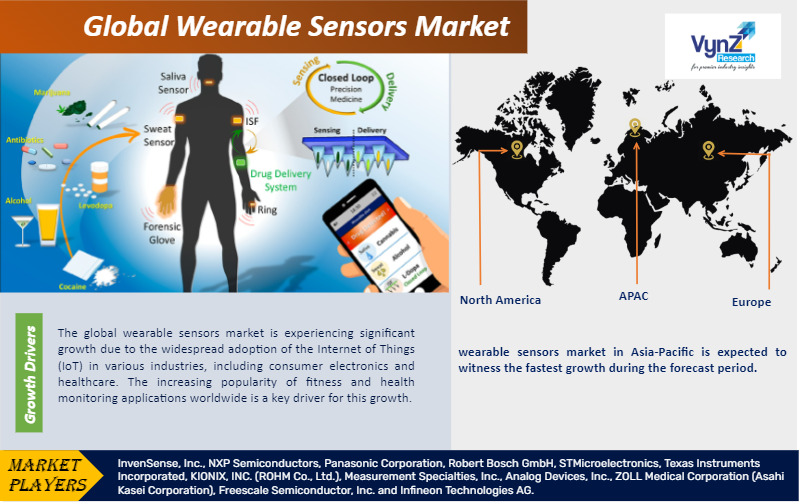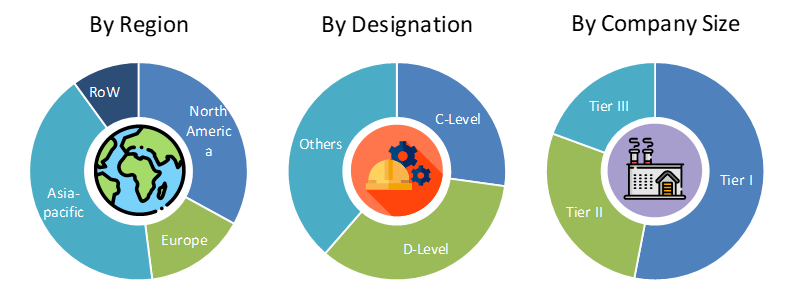| Status : Published | Published On : Jan, 2024 | Report Code : VRSME9017 | Industry : Semiconductor & Electronics | Available Format :

|
Page : 122 |
Global Wearable Sensors Market – Analysis and Forecast (2025 – 2030)
Industry Insights by Type (Medical Based Sensors, Image Sensors, Motion Sensors, Pressure Sensors, Position Sensors, Inertial Sensors, and Others), by Application (Wristwear, Eyewear, Footwear, Neckwear, Bodywear, and Others), by Vertical (Industrial, Consumer, Healthcare, and Others)
Industry Overview
The Global Market For Wearable Sensors is projected to achieve a significant milestone, reaching a value of USD 6.8 billion by 2030. This impressive growth is anticipated to be driven by a remarkable compound annual growth rate (CAGR) of 32.4% throughout the forecast period. Key factors contributing to this expansion include advancements in wearable sensing technology, wireless communication techniques, efficient processing systems, and energy-saving capabilities. Wearable sensors play a crucial role in enabling users to monitor various vital signs such as blood pressure, heart rate, respiratory rate, and body temperature. They also offer valuable features such as fall detection, drowning prevention, and sleep monitoring.

Moreover, the growth of wearable sensors market is exaggerating due to increasing demand of wearable sensors among working woman in various developed as well as developing economies as it helps them in monitoring their infants. These factors and increasing benefits of wearable devices are thereby exaggerating the growth of wearable sensors market across the globe.
Wearable Sensors Market Segmentation
Insight By Type
On the basis of type, the global wearable sensors market is segmented into medical based sensors, image sensors, motion sensors, pressure sensors, position sensors, inertial sensors and others. Among different types of wearable sensors, motion sensors hold the largest share in the wearable sensors market, globally. The category is expected to witness a CAGR of 33.1% during the forecast period, since it is helping the business enterprises in generating enhanced output and provide extensive precision while monitoring and tracking activities of users.
Moreover, the capability of this sensor that helps in distinguishing whether the user is shaking the wrist or taking steps is the major factor contributing towards the overall growth of the wearable sensors market, globally.
Insight By Application
On the basis of application, the global wearable sensors market is segmented into wristwear, eyewear, footwear, neckwear, bodywear, and others. Among all the applications, body wears are expected to witness significant growth in demand for wearable sensors during the forecast period since this segment is observing wider application among various industry domains such as healthcare, electronics and industrial.
Bodywear comprises of a textile that is entrenched with sensors that is the key trend observed in the growth of global wearable sensors market. Furthermore, body wears comprises of technology-driven fashionable clothing that fetches sensors close to the skin of the human body that further helps in assessing numerous fitness and health factors.
Insight By Vertical
Based on end-user, the wearable sensors market is segmented industrial, consumer, healthcare and others. Among all these segments, consumer segment is expected to witness the highest CAGR during the forecast period due to increasing demand for sensor-fused systems that is attributed towards extensive accessibility and awareness regarding remote observation of fitness and wellness. Furthermore, increasing demand of consumers pertaining to VR headsets, wrist-worn and smart clothing along with excessive emphasis from business providers to provide optimal and innovative elucidations to users are thereby strengthening the growth of the wearable sensors market.
Global Wearable Sensors Market Report Coverage
|
Report Metric |
Details |
|
Historical Period |
2018 - 2023 |
|
Base Year Considered |
2024 |
|
Forecast Period |
2025 - 2030 |
|
Market Size in 2024 |
U.S.D. xx.x Billion |
|
Revenue Forecast in 2030 |
U.S.D. 6.8 Billion |
|
Growth Rate |
32.4% |
|
Segments Covered in the Report |
By Type, By Application and By Vertical |
|
Report Scope |
Market Trends, Drivers, and Restraints; Revenue Estimation and Forecast; Segmentation Analysis; Impact of COVID-19; Companies’ Strategic Developments; Market Share Analysis of Key Players; Company Profiling |
|
Regions Covered in the Report |
North America, Europe, Asia-Pacific, Middle East, and Rest of the World |
Industry Dynamics
Wearable Sensors Market Trends
Increasing utilization of smart glasses that help in creating appealing experience to the users is the key trend observed in the wearable sensors market. These glasses provide mixed reality understanding to the users and with key players such as Microsoft, Google and Intel evolving and enhancing glasses this market is expected to witness increasing demand of these products that can be purchased at affordable prices. Additionally, increasing requirement for data related to health and fitness that helps in understanding various health-related issues to the doctors is another key trend strengthening the growth of wearable sensors market worldwide.
Wearable Sensors Market Growth Drivers
The global wearable sensors market is experiencing significant growth due to the widespread adoption of the Internet of Things (IoT) in various industries, including consumer electronics and healthcare. The increasing popularity of fitness and health monitoring applications worldwide is a key driver for this growth. Numerous manufacturers in the wearable device industry have incorporated contextual data and information to accurately detect and track motion activities. The insights and analysis derived from these devices play a crucial role in establishing fitness goals and providing valuable feedback to users.
Moreover, increasing expenditure of consumer in observing activities such as heart rate, fall detection, blood oxygen level and calorie count is another factor that is driving the growth of global wearable sensors market.
Wearable Sensors Market Challenges
High cost of wearable products along with stringent regulatory compliances are expected to hinder the growth of the wearable sensors market, globally. Furthermore, shortage of common standards and interoperability concerns is the major factor that is restraining the growth of global wearable sensors market.
Wearable Sensors Industry Ecosystem
Globally industry players of global wearable sensors market are leveraging market growth through new product development, mergers & acquisitions, partnerships, increased investments and technological upgradation that is bolstering the market demand for image sensors market across the globe.
Recent Devlopments By the Key Players
InnoPhase IoT, Inc.(a leading fabless semiconductor company specializing in ultra-low power Wi-Fi IoT) has collaborated with TDK InvenSense to deliver sustainable sensor to cloud IoT solutions with exceptional user experience. The integration shall provide direct connectivity to the cloud without needing external MCUs, lowers power consumption and total cost of ownership, and dramatically increases battery life.
NXP Semiconductors N.V. has partnered with Bitsensing to deliver AI-enhanced automotive radar solutions.
Wearable Sensors Market Geographic Overview
Geographically, wearable sensors market in Asia-Pacific is expected to witness the fastest growth during the forecast period since OEMs are creating considerable support towards the enlargement of IMUs (inertial measurement unit) and MEMS (micro electro mechanical systems) technology that is helping various business organizations in assigning lower prices to the newly developed products from them. Moreover, it has been observed that there are several key players in Japan and China that are extensively investing towards the development and advancement of sensors that are pertaining towards the increasing demand of health and fitness tracking systems.
Moreover, wearable sensors market in North America generate the largest revenue and is anticipated to witness significant growth during the forecast period. The largest revenue of this region is accredited towards extensive adoption of digital technique among business enterprises in North America. Additionally, thriving healthcare domain in this region is accentuating the acceptance of wearable sensors products that is further contributing towards the growth of wearable sensors market in the near future.
Wearable Sensors Market Competitive Insight
- NXP Semiconductors
- Panasonic Corporation
- Robert Bosch GmbH
- Sony Corporation
- STMicroelectronics
- Texas Instruments Incorporated
- KIONIX INC. (ROHM Co. Ltd.)
- Measurement Specialties Inc.
- Analog Devices Inc.
- ZOLL Medical Corporation
- Freescale Semiconductor Inc.
- Infineon Technologies AG.
The Wearable Sensors Market report offers a comprehensive market segmentation analysis along with an estimation for the forecast period 2025–2030.
Segments Covered in the Report
- By Type
- Medical Based Sensors
- Image Sensors
- Motion Sensors
- Pressure Sensors
- Position Sensors
- Inertial Sensors
- Others
- By Application
- Wristwear
- Eyewear
- Footwear
- Neckwear
- Bodywear
- Others
- By Vertical
- Industrial
- Consumer
- Healthcare
- Others
Region Covered in the Report
- North America
- U.S.
- Canada
- Mexico
- Europe
- Germany
- U.K.
- France
- Italy
- Spain
- Russia
- Rest of Europe
- Asia-Pacific (APAC)
- China
- Japan
- India
- South Korea
- Rest of Asia-Pacific
- Rest of the World (RoW)
- Brazil
- Saudi Arabia
- South Africa
- U.A.E.
- Other Countries
PRIMARY RESEARCH INTERVIEWS - BREAKDOWN

Frequently Asked Questions
Purchase Options
Latest Report
Research Methodology
- Desk Research / Pilot Interviews
- Build Market Size Model
- Research and Analysis
- Final Deliverabvle
Connect With Our Sales Team
- Toll-Free: 1 888 253 3960
- Phone: +91 9960 288 381
- Email: enquiry@vynzresearch.com
Wearable Sensors Market
